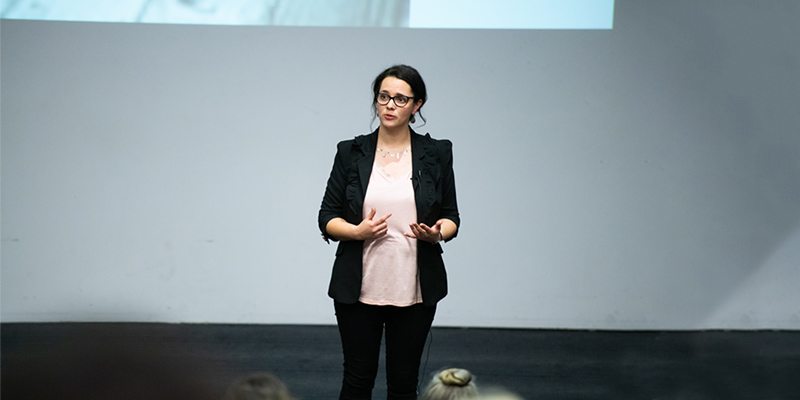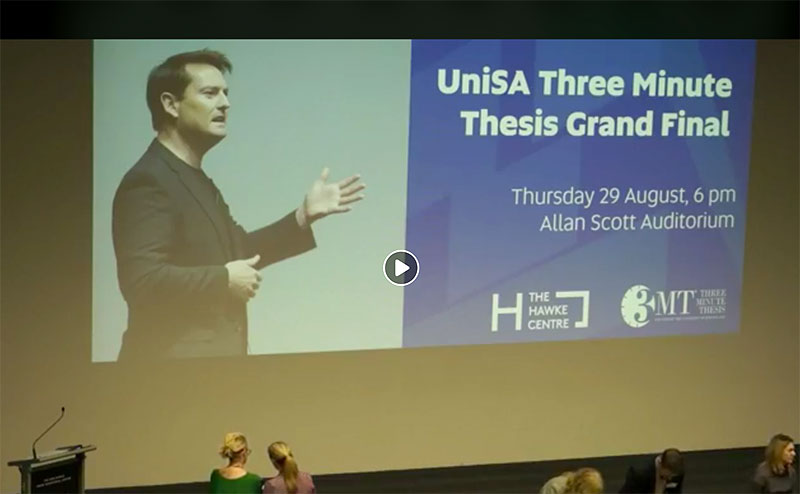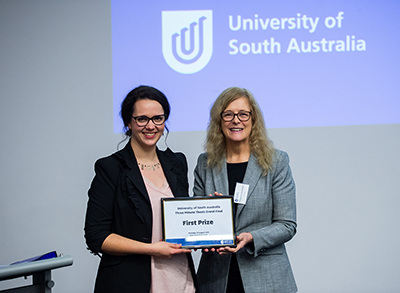Personal approach to mental health wins Three Minute Thesis final
By Annabel Mansfield
 RESEARCH UniSA PhD candidate Ellen Davies.
RESEARCH UniSA PhD candidate Ellen Davies.Amid drone-tracking laser beams, native fruit to treat DNA damage, and user-friendly virtual reality, it was an innovative person-centric assessment tool to enhance mental illness recovery, that won first place at UniSA’s recent Three Minute Thesis (3MT) Grand Final.
 Watch the UniSA Three Minute Thesis Grand Final.
Watch the UniSA Three Minute Thesis Grand Final. UniSA PhD candidate Ellen Davies, from UniSA’s School of Nursing and Midwifery, spoke about her new Needs in Recovery Assessment (NiRA) tool, which is designed to identify and prioritise the unmet needs of people recovering from a first episode of mental illness.
Davies says the NiRA will help mental health clinicians provide timely and tailored care for patients and facilitate recovery.
“In Australia, nearly half the population will experience a mental illness at some time in their lifetime,” Davies says.
“Recovering from a mental illness is not an easy undertaking – many people feel as though their lives have been turned upside down.
“When someone we know is unwell, it’s natural to ask about what they might need to help them recover, but how often do we actually hear a response that addresses a specific need?
“Being able to articulate what you really need after suffering a first episode of mental illness is extremely challenging.
“Despite having a range of unmet needs, people find it hard to answer the question ‘do you need anything?’ – it just doesn’t work.
“Through NiRA, mental health clinicians can ask about a broad range of needs to ensure their patients receive personalised, relevant assistance to give them their best chance of successful recovery.”
Davies says the NiRA will provide clinicians with a comprehensive and systematic tool for identifying unmet emotional, informational, financial, functional, physical, psychological, practical and social needs, and for developing a plan with service users to set goals in order to meet these needs.
 UniSA 3MT Grand Final Winner 2019, PhD candidate Ellen Davies, pictured with Professor Caroline McMillan, Chief Scientist of South Australia.
UniSA 3MT Grand Final Winner 2019, PhD candidate Ellen Davies, pictured with Professor Caroline McMillan, Chief Scientist of South Australia.“Patients recovering from a mental illness need to feel safe, stable and secure,” Davies says. “They need to understand what’s happening to them and feel understood by others.
“Using this tool we can identify that an 18-year-old recovering from a first episode of psychosis needs to work out how to get an income because he doesn’t have enough money for food every day … that a 45-year-old, who must take leave from work because of an episode of depression, needs help to reenter the workforce … or that a 60-year-old recovering from an episode of mania, needs support to manage their finances and arrange transport to medical appointments.
“NiRA is all about personalised care to meet the unique needs of individuals, so that they feel safe, heard, and empowered to start a road to recovery.”
The Three Minute Thesis (3MT®) is a national competition celebrating the research undertaken by PhD candidates. Davies was one of eight finalists who pitched their research in three minutes to a packed audience at UniSA’s City West campus. The event was presented in partnership with The Bob Hawke Prime Ministerial Centre.
Davies will now represent UniSA at the Asia-Pacific 3MT national final to be held on 4 October 2019, as well as receive a $3000 travel grant to support her research.
The second placegetter was Jessica Porter from UniSA’s School of Commerce, who is investigating policy measures to boost the supply of affordable housing. Third place went to Darren Taljaard, from the School of Art, Architecture, and Design, who is using design principles to improve digital reading materials for adults with dyslexia.
The People’s Choice award went to Bradley Herbert, from the School of Information Technology and Mathematical Sciences, who is investigating user-friendly, personalised ways for augmented reality to help people troubleshoot everyday technological problems.
Dean of Graduate Studies, Professor Pat Buckley, says the calibre of research was outstanding.
“To hear candidates present so compellingly on questions of importance to society, and questions explored in partnership with communities and industry, is just terrific,” Prof Buckley says.
“It speaks to the DNA of research at UniSA, and to the impact these researchers are having today and will continue to have into the future.”
Other Stories
- BOSS result for UniSA's MBA
- Super-powered immune cells – leading the next cancer breakthrough
- It’s time to end Australia’s culture of workplace bullying
- Personal approach to mental health wins Three Minute Thesis final
- From the Vice Chancellor
- Achievements and Announcements
- Research breakthrough to safely monitor pre-term babies
- $3.9m for research into chronic pain, prenatal genetic testing and heart health
- UniSA opens free tax clinic
- Depression breakthrough: ‘Black Dog’ blamed for major diseases
- Women executives need to work an extra 64 days a year to catch up to men
- UniSA to offer Speech Pathology in 2020
- What works in the workplace?
- UniSA collaboration for a double-barrelled PhD to advance industry expertise in human factors and engineering
- Australians not ‘walking the talk’ when it comes to the environment
- The latest books from UniSA researchers
- Sleeping rough, Ben Folds and social activism




